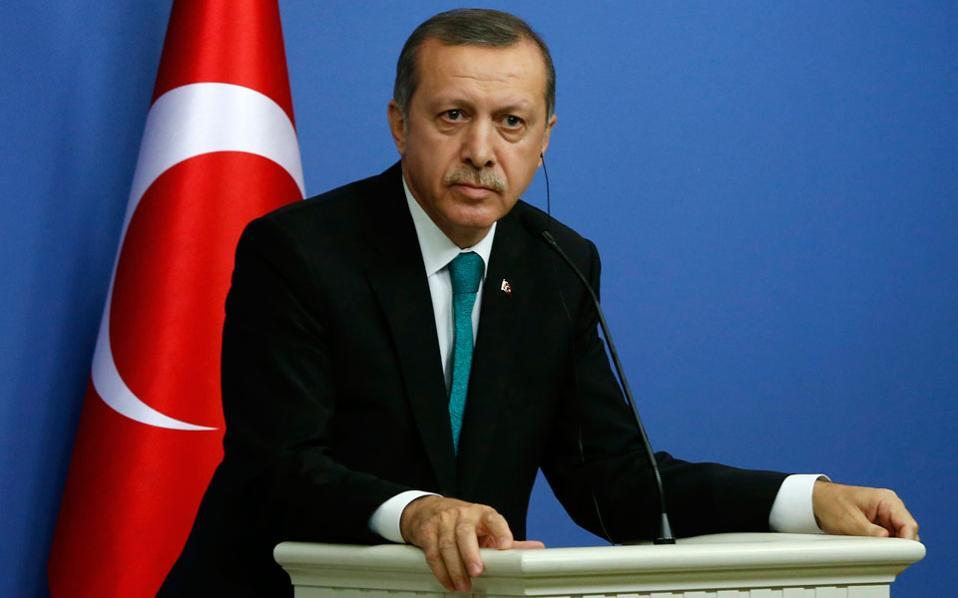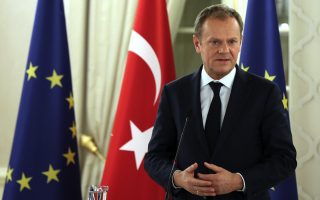Turkey presses for EU concessions as price for halting refugees

Turkey wants three things in return for stopping the transit of refugees from the Middle East to the European Union: money, a quicker path toward joining the EU, and the no-questions-asked right of Turks to travel to Europe.
The first is no problem, the second a bit trickier. The hardest to deliver, for a 28-nation bloc beset by fears of terrorism and anti-foreigner demagoguery, is visa-free entry for 78 million Turks as of July. EU leaders meet Thursday to hash out an offer.
“Turkey is in a difficult situation, but it’s trying to get the best out of it for itself,” Amanda Paul, an analyst at the European Policy Centre, said of the diplomacy that will unfold in Brussels on Thursday and Friday. “The EU is more desperate than Turkey.”
A deal to shut the Turkish migration channel would be an enforcement nightmare. It could be upended by a new exodus from Syria’s civil war, weather patterns in the Aegean Sea or the map-reading skills of refugee smugglers bent on finding other routes to ferry their human cargo to Europe.
The deal EU leaders come up with on Thursday will be presented to Turkish Prime Minister Ahmet Davutoglu the next day. It will draw on joint Turkish-German proposals that met a largely favorable reception by EU leaders on March 7.
‘Share the burden’
Those leaders showed in Europe’s debt-crisis summitry how agreements on paper can unravel in practice. There was an abundance of false starts – does anyone remember the Euro Plus Pact of 2011? – and commitments that crashed into economic reality.
German Chancellor Angela Merkel, the key figure in that previous episode of policy experimentation, is under greater pressure to stem the refugee tide after discontent with her open-door approach helped lift the anti-immigration Alternative for Germany party to a record in three state elections on March 13.
“It isn’t to Europe’s credit that, as a union of 28 member states and 500 million citizens, we’ve found it so hard to share the burden,” Merkel said Wednesday in Berlin.
The underlying bargain, already contested by human rights lawyers, is a human swap on a grand scale: once Turkey takes back Syrian refugees who reach EU soil in Greece, European governments would offer asylum to the same number that are currently in Turkish camps.
The idea is to reward those who waited in Turkey to pursue official channels of entry while deterring those considering the illegal Aegean crossing.
The refugee carousel would be “temporary and extraordinary,” according to a confidential EU options paper published by www.statewatch.org.
European governments that have fallen short on previous refugee-relocation commitments would also have to take in greater numbers.
Turkey-Cyprus rivalry
Animated by terror scares – this week saw the third bombing in five months in Ankara, the Turkish capital, and a botched manhunt in Brussels, the EU capital – both sides want to make the displaced people from Syria’s five-year civil war someone else’s problem.
Turkey is strutting its newfound leverage over the EU. President Recep Tayyip Erdogan is escalating his crackdown on dissenters and the media, running roughshod over EU-style pluralism demanded of future members.
Proposed sweeteners for Erdogan include an extra 3 billion euros ($3.3 billion) to run Syrian refugee camps in Turkey – loose change that can be found in the central EU and national budgets.
Speeding Turkey’s entry talks – all but moribund since starting in 2005 – is more fraught. The bid is snagged by Turkey’s historic rivalry with Cyprus, the Mediterranean island divided since 1974 between a Turkish-occupied north and Greek-speaking south.
Cyprus – the internationally recognized south, that is — has the whip hand. It is in the EU and wants to put off concessions that, it fears, would sabotage the best opportunity in years to reunify the island.
24.50 euro service charge
“Yes to Europe, no to Turkey,” Cypriot Foreign Minister Ioannis Kasoulides told Bloomberg Television on Wednesday. “We have to protect the process of peace in Cyprus.”
As a result, the most Turkey can get from the EU in the near term is the visa waiver. While the European rejection rate for Turkish visa applicants is only 4.4 percent, the requirement smacks of second-class treatment for Turks and turns an untold number off from trying.
Turks wanting to see the Eiffel Tower, for example, have to call between 8:30 a.m. and 12 p.m. or 1 p.m. and 5 p.m. for a visa appointment, according to the website of the French embassy in Ankara. Short-stay visas cost 60 euros for adults and 35 euros for children – both nonrefundable, though babies are free – and a service charge of 24.50 euros.
Turkey’s plea to end those bureaucratic hassles collides with EU efforts to keep people out, notably “irregular” migrants and potential fellow travelers of terrorists who carried out last year’s attacks on civilians in Paris in the name of the Islamic State.
Biometric passports
French President Francois Hollande insists that Turkey strictly meet 72 criteria such as the issuance of fraud-proof biometric passports to win visa-free status. Turkey has some way to go: the European Commission sees 19 of the targets as met, 17 almost met, 33 partially met and three unmet.
Visa liberalization is ruled out by factions including the Christian Social Union, Merkel’s Bavarian allies. While no government could cast a veto on its own, a contested vote on visa-free would again expose EU dissension. And resistance is mounting in the European Parliament.
Cyprus has a word to put in on visas too. Turkey currently requires would-be Cypriot visitors to adopt the fictive designation of citizen of the “Greek Cypriot Administration of Southern Cyprus.” It would have to go.
The commission, the EU’s executive arm, set an end-of-April deadline for Turkey to meet the remaining visa-free targets and insisted it won’t fudge the criteria.
“We’re certainly not giving Turkey a free ride,” Frans Timmermans, the commission’s principal vice president, said Wednesday.
[Bloomberg]





